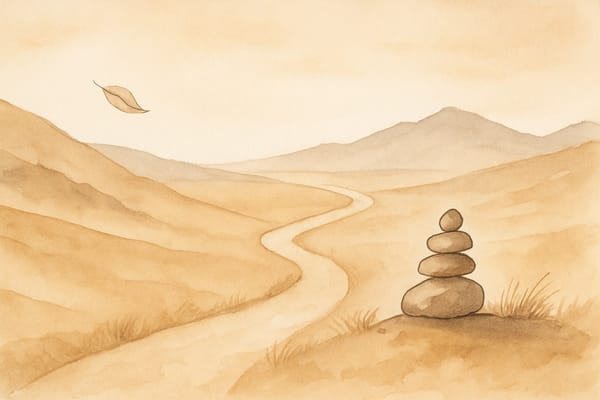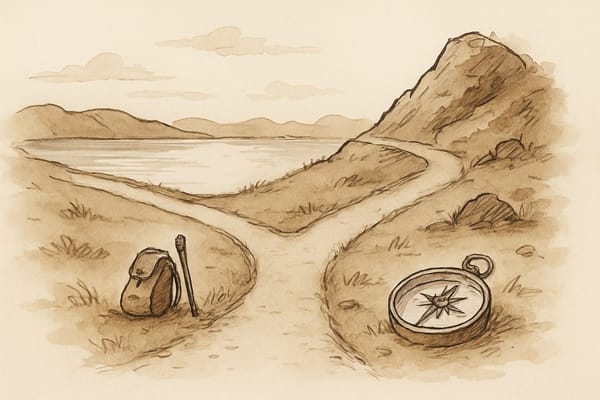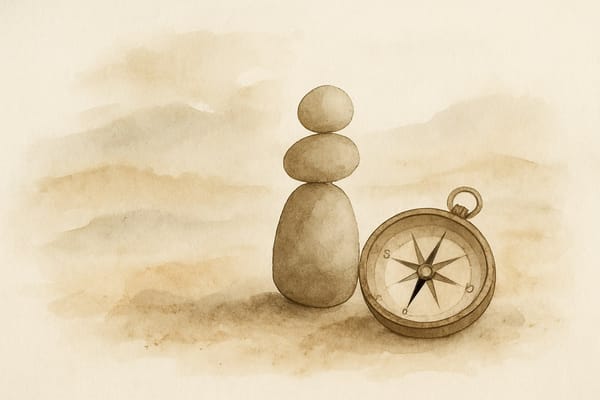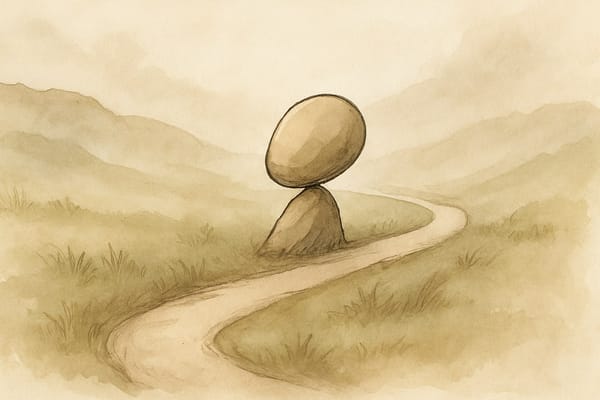The Beginning
What happens when you stop reading about Stoicism and start living it? This post sets the stage for a weekly experiment in applied philosophy, exploring what it means to live rationally, ethically...and maybe even joyfully.
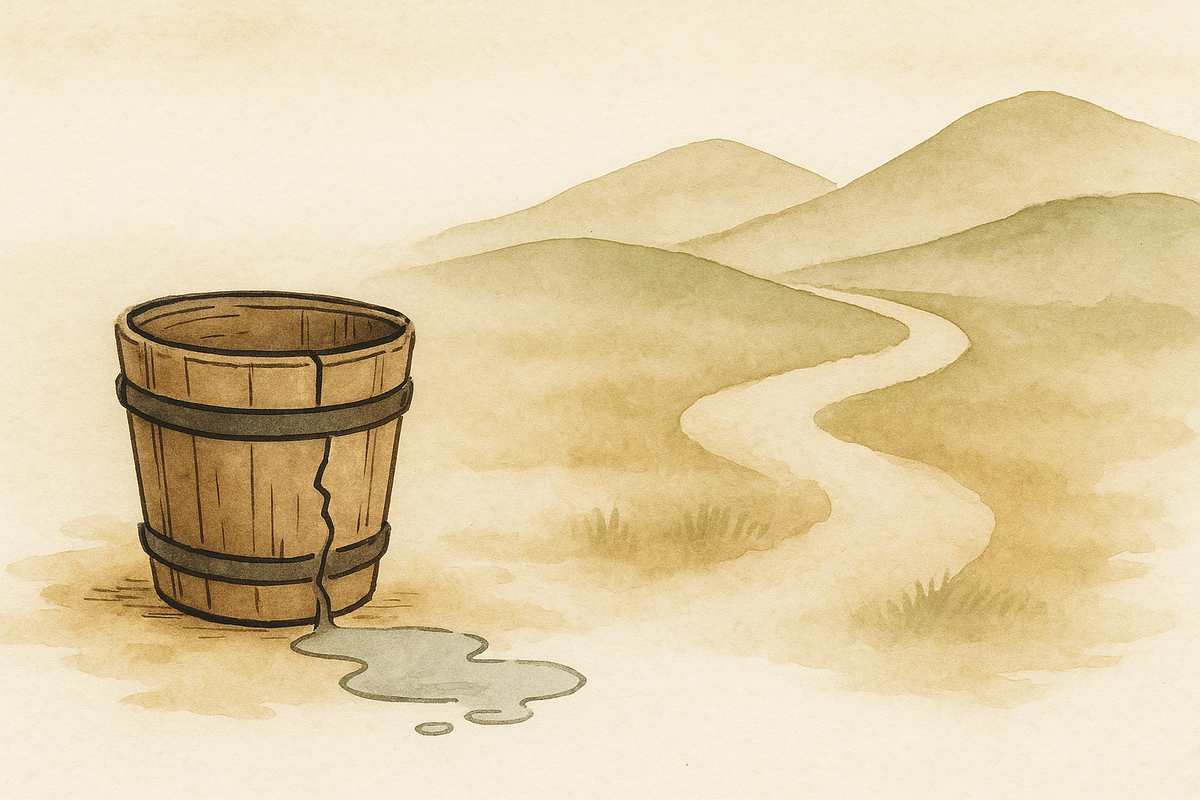
Stoicism as a philosophy has already been described by minds far greater than mine.
However, what I find missing are the personal and honest accounts of what it's actually like to live it.
That’s what this website is about.
I’m not here to teach or theorize, I’m here to practice, to live it out and share what happens along the way.
Every week I’ll post a reflection on how I’ve applied Stoicism to real events: the good, the bad, and the confusing.
Before looking at the importance of having a philosophy of life, and why I believe Stoicism to be the greatest choice (at least in my case), let's define more precisely what I mean when I say Stoicism–and what I don't mean.
What This Is (And What It Definitely Isn’t)
If you’ve looked into Stoicism before, you’ve probably seen a wide range of flavors.
There’s Broicism, which turns the philosophy into a macho mindset of self-optimization, relentless grinding and emotional suppression. A favorite among the gym-bros and military servicepeople alike!
There’s $toicism, where Stoic quotes get turned into merchandise (think Memento Mori fridge-magnets instead of Carpe Diem) and the philosophy becomes more of a product than a path.
And then there’s small s stoicism, the everyday misunderstanding that being “stoic” means being cold, detached and emotionally numb, far from what ancient Stoicism actually stood for.
I'll be following Modern Stoicism, the Stoic philosophy I believe the old Stoics themselves would have followed.
Modern Stoicism is a secular continuation of the ancient philosophy that's evolving in line with its own principles: reason, evidence, and critical reflection.
It stays true to the foundational ideas of the Stoics, while adapting to modern insights from science and psychology.
Luckily, it requires no belief in Zeus, divine providence or fate.
As the experiment unfolds and I continue to learn along the way, my views may change.
However, these are the assumptions I'll be starting with:
- Eudaimonia (a flourishing fulfilling life) is the highest good.
- Virtue is intrinsic to Eudaimonia.
- Virtue consists of Moderation, Courage, Justice, Wisdom.
- Moderation: Healthy self-control, balancing desires and avoiding extremes.
- Courage: Acting rationally despite fear, discomfort, pain and uncertainty. Doing the right thing even when it's difficult.
- Justice: Treating others fairly, honestly, compassionately, with respect and ethically. Focusing on people and community even when it's difficult.
- Wisdom: Clear thinking (seeing things objectively), rational understanding (understanding the cause-effect chain), remembering the dichotomy of control (what impressions we give assent to) and understanding what is good and bad.
- Virtue is the only true good, because it is the only thing fully within our control.
- Externals (health, wealth, status etc) are neither good nor bad, only preferred or dispreferred. They do not define a good life.
- The goal of life is to live in accordance with nature, for humans that means living rationally and in harmony with others (explained by the Virtues, leading to Eudaimonia).
- Stoicism is, above all, an ethical philosophy. Its core concern is how we live, what we value, and how we treat others.
- Stoicism is compatibilist, it teaches that even in a determined universe we are free to choose our judgments and actions. This inner freedom is where virtue lives.
- Using Stoic tools doesn’t make someone a Stoic any more than meditating makes someone a Buddhist.
Why Choose a Philosophy of Life at All?
We all live by some kind of philosophy whether we realize it or not.
The question is whether it’s chosen or accidental.
The problem with having an unexamined philosophy is that you might spend your life chasing the wrong things–only to realize it when it's too late.
Just living without asking what we're living for, usually defaults to hedonism.
That means chasing pleasure and avoiding pain–nothing more, nothing less.
Eventually we (and all the rockstars of the world) realize that pleasure is fleeting and pain inevitable, so we turn to the self-help section where techniques and mindsets promise happiness, success, and relief.
At this point we could call ourselves enlightened hedonists.
We know what we want, what we don't want, and have a method for getting there.
I dedicated 10 years of my life to meditating 30+ minutes a day, read more self-help books than you could fit in two large bookshelves, took thousands of cold showers, read 4 translations of the Tao Te Ching... I went for it.
Just another self-help junkie.
But I've found that using self-help to live a good life is kind of like pouring water into a bucket with a hole in it, constant effort but no lasting fullness.
When the bucket keeps leaking, the answer isn’t to pour faster.
It’s to rethink what we’re doing altogether.
That’s where having a chosen philosophy of life comes in.
Why Stoicism?
There's much to be said about this philosophy in comparison to others, but what really stands out to me are:
- Relentless focus of practicing and living the philosophy, not just abstractly theorizing about it.
- It recognizes that some things are within our control and others are not, and that we can only be reasonably responsible for the first.
- It puts fulfillment and flourishing above both pleasure and pain.
This is a way of life that's existed for over 2,300 years and been lived by emperors and slaves alike.
It's own foundational principles of reason and learning makes it fully consistent with a modern way of life.
It's simply the most sensible approach to life I've come across so far.
The Goal
What really happens when you follow Stoicism as a chosen philosophy of life?
Does living a virtuous life actually lead to fulfillment?
Maybe most importantly: is it worth it?
My goal is to explore these questions by living the philosophy and sharing the experience honestly.
I hope it inspires you to try it yourself and reflect on what it does for your own life.
If this resonates with more people, I’d love to grow a community of people doing the same: sharing their journeys, insights, and challenges.
If enough people find value in it, I’d love to eventually turn it into a non-profit where any income from paid memberships would go toward spreading Stoic principles, supporting meaningful initiatives, and funding charities chosen by the community.
Conclusion
This is an ongoing experiment. The philosophy is old, but the life I’m applying it to is very much modern. I won’t always get it right, but I'll be doing my best. If any of this helps us live a little better, then it’ll already have been worth it.
Let's get started!


